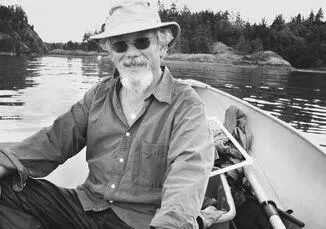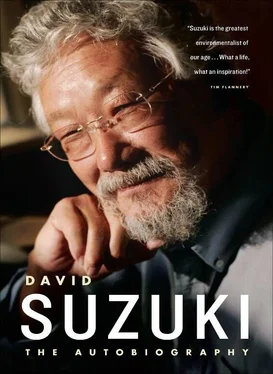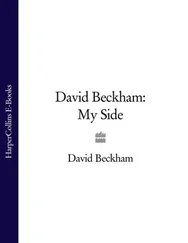
Enjoying my favorite pastime around the corner from Tangwyn and the cottage
The fish don't volunteer to be a part of our “sport,” and the notion of torturing them for pleasure and then releasing them as if we are being considerate and protective simply perpetuates the notion that nature and other species are playthings for our enjoyment. I know vegans condemn the catching and eating of fish as antithetical to a reverence for life, but I accept that as an animal, I depend on the consumption of other life to survive (plants are life forms too), and I try to do it with respect and gratitude.
IF WE AVOID TRAFFIC jams and make all the ferry connections just right, it takes just over five hours (six if we're unlucky) to get from Vancouver to Tangwyn. As we ride the last ferry from Campbell River to Quathiaski Cove on Quadra, our excitement grows and we delight in the sight of the island hills covered in forest, the dense schools of herring, the fishing boats pursuing salmon, and the ever-present eagles ready to swoop down and take a careless fish. We feel the joy of arriving back where nature is still abundant and intact.
But when we talk to our neighbors who have lived in the area for fifty years or more, they describe a world that no longer exists around there: bays filled with abalone, red snapper, gigantic ling cod and rock cod as long as an arm, herring so abundant they could be raked off the kelp to fill a punt in minutes, and schools of salmon so thick they could be heard coming as their bodies slapped the water miles away. Today all of that is gone. Six years after we had bought Tangwyn, we were fishing for rock cod when Tara hooked a large ling. I watched in disappointment yet admiration as she removed the hook and carefully returned the fish to the water. “This is the first big ling we've seen in six years,” she said. “We can't kill it.”
Even in the brief time Tangwyn has been part of our lives, we have seen the herring vanish because of the insane fishery permitting the capture of spawning herring for the females' ovaries, which bring a high return in Japan. I call it insane because herring are one of the key prey species for salmon, seals, whales, and other carnivorous fishes, and First Nations have long harvested their eggs without killing the fish. Because the spawning herring form large schools, they become such easy prey that the Department of Fisheries and Oceans actually has had ten-minute openings — seiners are allowed ten minutes to set their nets with the potential to make a year's worth of pay for the crew members. What kind of a delusion is it to think a ten-minute season is a fishery that is sustainable? Years ago, one opening for the herring roe fishery wiped out the large populations around Tangwyn, and they still haven't come back.
Abalone were once abundant throughout the islands in Georgia Strait, but when scuba divers were allowed to “harvest” them, they quickly disappeared and have not come back. In the fifteen years we have gone to Tangwyn, we have found two live abalone — essentially they are extinct, and it is highly doubtful they will ever come back within my children's lifetime.
Geoducks (pronounced “gooey-ducks”), the huge clams whose siphons are highly prized in Asia, are being blasted out of the ocean bottom by divers wielding pressure hoses. The clams are like nuggets of gold but are exploited with almost no idea of their biology or life cycle; they may reach decades if not a century or more in age. I watched in helpless fury as divers spent two days off the shores of Tangwyn pumping geoducks out of the ocean floor. We were delighted to find a small patch of perhaps fifty geoducks at low tide that had been missed by the commercial divers, only to see them trashed by oyster farmers dragging heavy loads of spat-laden shells across them.
Rock cod, which we once took for granted as a dependable meal, have been depleted by commercial fishers, who ship them live to the Asian market. When the DFO announced a quota for sport fishers of one rock cod a day, it was clear the fish should be declared totally off-limits to all fishing until they can replenish themselves.
We tend to think of the oceans as a homogeneous environment from which we can catch creatures that are somehow magically replaced without end. We know that as a rule, the bigger, older animals are far more prolific than younger fish, yet we allow fishers to keep the largest and return the small ones as if somehow this is good management. I believe we should allow fewer fish to be caught, encourage release of large ones, and mandate that fishers stop letting the small ones go until a trophy fish is captured. Once sport fishers have caught their limit of salmon, they often target other fish, like ling and halibut, loading up with hundreds of pounds of fish. They may proudly display halibut more than six and a half feet long and weighing over 165 pounds and release the chickens (under 30 pounds), which is exactly the opposite of what should be done.
Since our purchase of Tangwyn, logging on Quadra has gone on steadily. As we drive from the ferry terminal at Quathiaski Cove and turn onto the road to Heriot Bay, the large swath of forest to our left was clear-cut long before we got there, and the section to our right was cleared a few years ago. The cynical strip of trees left standing beside the road cannot hide the devastation of clear-cutting. Every day, truckloads of trees leave the island; yet one of the ironies of globalization is that at the lumberyard on Quadra, the only lumber sold comes from California.
Another problem is that most of us today live in large cities: we've become urban animals, occupying a human-created environment that is almost devoid of biodiversity. We have a few domesticated plants and animals that we like to have around us, and we tolerate the pests we can't eliminate, but basically we live in a biologically impoverished region wherever we dwell. That means the baseline against which we judge the wildness of nature is so shallow that to us, the Tangwyn of today seems rich and abundant.
And that, it seems to me, is a major challenge we face as humanity explodes in numbers and consumptive demand — our collective memory is so short that we soon forget how things were. We take for granted a small cluster of trees in an empty lot, and then suddenly one day the trees are gone. Soon after, an apartment complex goes up. Within months, we barely remember the trees and open land that were once there. And so it goes all across the planet as we lose links to and reminders of a richer world that has disappeared in the name of economic development.
When I was growing up in Vancouver, Dad would row a boat around Stanley Park in downtown Vancouver, and catch sea-run cutthroat trout. We would jig for halibut off Spanish Banks on the city's waterfront, catch sturgeon in the Fraser River, and ride horses up the Vedder River to catch steelhead and Dolly Varden trout.
My grandchildren have no hope of experiencing the richness I knew as a child. And there is no longer any living memory of passenger pigeons, of prairie lands covered by millions upon millions of bison, which were preyed upon by grizzly bears all the way across to Ontario and down to Texas. And so we continue to celebrate our imprint across the land, taming the wild and reminding ourselves of what once was with the names of suburbs and streets — Oakview Lane, Forest Hills, Arbutus Drive.
When we purchased Tangwyn, the agent took great pains to inform us it could be subdivided into three pieces. “You could sell two and pay for all of it,” he said, as if that were an incentive and option. It wasn't. We are privileged to claim to own what was once First Nations land and would like to see it become a part of a larger entity, the forest. Subdividing it into smaller parcels that would be sold off to be developed further will not do that. Somehow we have to find a way to maintain the integrity of wild areas.
Читать дальше



![David Jagusson - Devot & Anal [Hardcore BDSM]](/books/485905/david-jagusson-devot-anal-hardcore-bdsm-thumb.webp)









